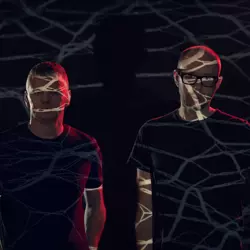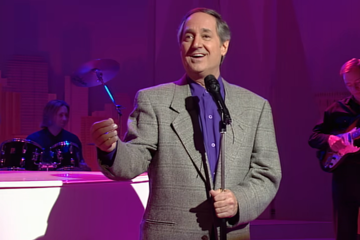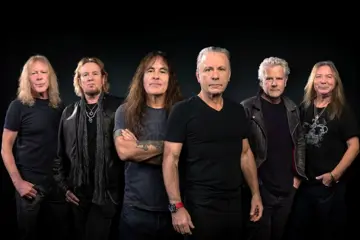 The Chemical Brothers
The Chemical BrothersCome With Us is in stores now.
Tom Rowlands and Ed Simons don't get off on Radiohead, but everybody asks them if they do. So what's so important about that? Simply, that The Chemical Brothers share the same kind of lofty regard afforded Radiohead. They've shown scant regard for the musical aristocracy or trend merchants and been remarkably true to their own vision. Their fourth album Come With Us isn't a masterpiece; it's too confused to be that. But it is very good. Its best moments are simply divine, the kind of stuff you want to scrawl on walls about. The end impression is of a band that is still on a journey and is still a little uncertain - as they were on Surrender - where they are going. There's still something unresolved or untouched in The Chemical Brothers musical map.
Both Rowlands and Simons are quite frank about that.
"They're getting harder to make, simply because of the amount of music we make and the fact we're always searching for new sounds and new ways of doing things," Rowlands says. "It's not like we're personal song writers: what may fire an album for them is your personal experiences and how they relate them to an experience; it doesn't really work like that for us. It's about how the sound affects you and creating the sounds and emotions and it's becoming more difficult to find things that inspire us, really, as much as music we've made before."
That's a big statement. Honest - but revealing a real creative vulnerability.
"What Tom was saying about it being harder to make this record is true," Simons says. "You know, 10 or 11 years of doing this together is a massive weight of things, a massive amount of records that have excited us, a lot of records we've made together. To still try and create records in the studio that have that same level of excitement ... it doesn't make us argue but it's frustrating, with this record, not to hit those heights all the time but when you do reach them it's even more gratifying. There were times when it wasn't particularly pleasant making this record just because it's hard to get to that next step where you feel really buzzed up on something. The times it happens are what you hear on the albums." Rowlands interjects, "That happened on Surrender as well."
The duo also sense that their place in dance space is not under threat. As bands and DJs come and go with monotonous hype and regularity, mostly stricken with a lack of imagination to move outside the rather narrow boundaries that success tends to want its chosen to operate within, the electronic scene may face an uncertain future. There were very few great electronic albums in 2001 and the big Chill set in.
Don't miss a beat with our FREE daily newsletter
"I don't want to bag," Simons say, "but I'd like to more excited. It would be good if you felt there was great music going on but the things that are put up as the new blood... I don't think Tom and I are quaking in our boots over them. I think our music is more effective than a lot of the new things that are happening. There's nothing that's particularly blowing me away in dance music. Put it that way."
Just as certainly, both men have little interest in being part of the underground. They want a big audience. Why wouldn't they. With Prodigy, Underworld, Leftfield and Orbital they took electronica to stadiums and arenas. There's no going back.
"We like our music to be understood," Simons says. "We've never found the attraction of making music people can't understand. There is an electronic music underground, which isn't commercial and doesn't do very well but we don't feel that the music that comes out of it is a superior product to our electronic music that people do understand. What does underground mean now? In terms of dance music, the dance music is pretty much the mainstream."
Rowlands takes over. "There's always an underbelly of music. If you're in Japan and you go to a techno club you might hear something else and there's a feeling that it's opting out of the mainstream. No matter how much dance music dominates the charts there's still that feeling of being in a club and it's 6am in the morning and it's illicit. It's a different thing to what other people are doing. You are coming home when they're going to work. There's that feeling you are doing something different and that still exists today. The music goes hand-in-hand with that. The idea of making something wilfully obscure is fine and people get into doing it and it's a cool thing to do that but we like playing music that really excites people and excites us when we play it."
















